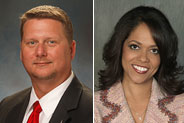Federal and State Regulatory Issues Focus of Day Two of Sixth Annual Center for Alcohol Policy Law Symposium
WASHINGTON, D.C. – The Sixth Annual Center for Alcohol Policy (CAP) Alcohol Law Symposium kicked off day two at the Grand Hyatt Washington in Washington, D.C., with a panel on antitrust developments in the alcohol industry, which noted the Obama Administration’s increased activity in the area of antitrust enforcement and the impact of the Department of Justice’s investigation into the AB-InBev merger with Modelo and ultimate settlement to approve the deal.
Sandeep Vaheesan, senior fellow at the American Antitrust Institute, spoke about the benefits of enforcing antitrust laws to ensure competitive markets and serve consumers’ interest in product quality, variety and price. Vaheesan noted that alcohol is not just any other commodity, like toothpaste or shoes, and there are also societal consequences that need to be addressed. Attorney David Balto highlighted the pro-competitive aspects of the independent three-tier alcohol distribution system in the United States saying, “Independent distribution is an important restraint to anti-competitive conduct.”
Former Arizona alcohol regulator and CAP Advisory Council member Jerry Oliver moderated a panel on federal and state alcohol regulatory issues. Steve Wing, associate administrator for alcohol policy at the Substance Abuse and Mental Health Services Administration, spoke about ongoing initiatives across federal agencies to research and reduce underage drinking, including efforts funded by the STOP Underage Drinking Act. Susan Evans, executive liaison for industry and state matters at the Alcohol and Tobacco Tax and Trade Bureau (TTB), described the TTB’s revenue collection and consumer protection role and its responsibility over permits, labeling and formula approvals for the alcohol industry. She noted TTB’s need for adequate funding in light of an increased workload resulting from a booming alcohol industry with thousands of new businesses entering the market.
State alcohol regulators from Idaho, West Virginia and Wisconsin responded to national survey findings that the public is very satisfied with America’s current alcohol regulatory safeguards and overwhelmingly agree that enforcement is key to alcohol regulation. They emphasized the need for adequate resources for state enforcement efforts that support a safe and orderly alcohol market. Roger Johnson of Wisconsin Alcohol and Tobacco Enforcement highlighted the value of the three-tier alcohol regulatory system in promoting a variety of products, assisting in tax collection and preventing problems with counterfeiting and overconsumption that plagues other countries like England. He warned against deregulatory efforts or changes to state laws that could have unintended consequences that undermine the excellent alcohol regulatory systems that exist today.
The symposium concluded with a presentation by Jack Marshall of ProEthics on the challenge of keeping pace with professional ethics in times of rapid change.
More details on speakers, education session topics and the symposium program can be found at www.centerforalcoholpolicy.org. Click here to read a summary from day one of the symposium, and read live updates from the event on Twitter using the hashtag #CAPLaw.
###
The Center for Alcohol Policy is a 501 c (3) organization whose mission is to educate policy makers, regulators and the public about alcohol, its uniqueness and regulation. By conducting sound and scientific-based research and implementing initiatives that will maintain the appropriate state-based regulation of alcohol, the Center promotes safe and responsible consumption, fights underage drinking and drunk driving and informs key entities about the effects of alcohol consumption. For more information, visit www.centerforalcoholpolicy.org or follow the Center on Twitter at www.twitter.com/AlcoholPolicy.

